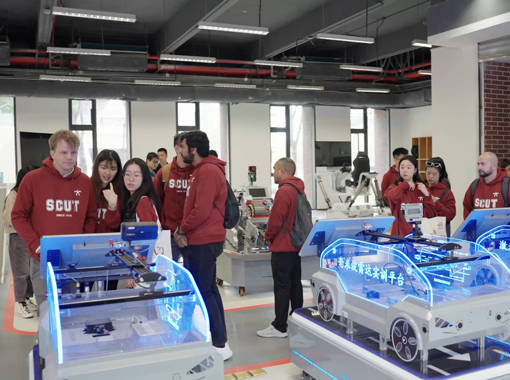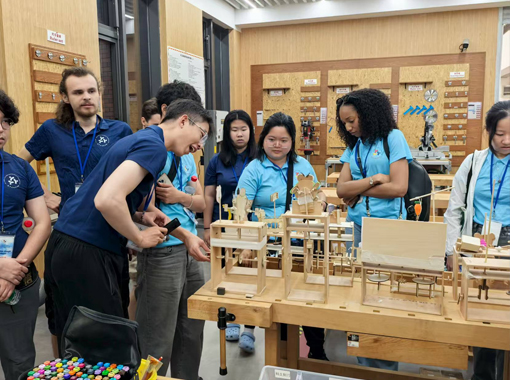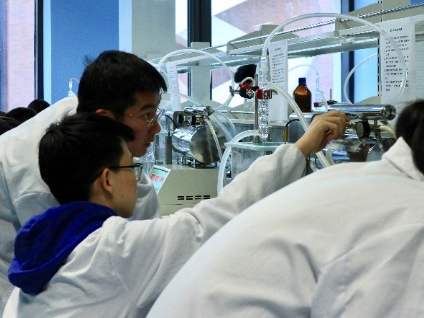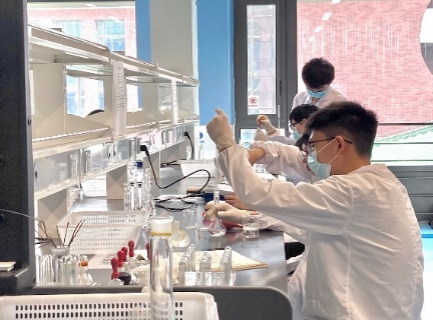Nurturing Future Leaders in Emerging Engineering
At Guangzhou International Campus (GZIC), cultivating talents with innovation, creativity, and entrepreneurial spirit is at the core of its educational mission. Through a holistic integration of theoretical education, practical training, and cutting-edge research platforms, GZIC has developed a distinctive approach to nurturing future-ready talents capable of addressing global challenges.
By aligning its Innovation Factory(IF) with cutting-edge disciplines, GZIC aims to train internationally competitive talents in emerging engineering fields. Through a seamless blend of theoretical rigor, practical innovation, and entrepreneurial mindset, the campus empowers students to become leaders capable of solving global complex challenges—epitomizing its commitment to innovation and entrepreneurship in higher education.
Educational Philosophy:
Integrating Theory and Practice for Holistic Competence
GZIC’s talent development philosophy is rooted in fostering comprehensive capabilities—self-directed learning, critical thinking, analytical skills, and problem-solving prowess. To achieve this, the campus combines:
Theoretical and practical courses in innovation and entrepreneurship, ensuring students grasp foundational knowledge while applying it in real-world scenarios.
Hands-on training programs and participation in national and international academic competitions, which serve as catalysts for translating ideas into tangible outcomes.
Innovation Factory
IF provides students three levels of innovation training (basic training, professional training, and entrepreneurship training) through Innovation Factory 1 to 3, building an advanced innovation workshop that integrates industry, academia, and research, with engineering training running through the four years at the university.IF provides students three levels of innovation training (basic training, professional training, and entrepreneurship training) through Innovation Factory 1 to 3, building an advanced innovation workshop that integrates industry, academia, and research, with engineering training running through the four years at the university.IF provides students three levels of innovation training (basic training, professional training, and entrepreneurship training) through Innovation Factory 1 to 3, building an advanced innovation workshop that integrates industry, academia, and research, with engineering training running through the four years at the university.
Innovation Factory 1.0:
Building Fundamental Competence with Global Standards


Completed in 2020, the Innovation Factory 1.0 (also known as the International Advanced Public Basic Laboratory Center) focuses on strengthening students’ foundational skills. Housing 52 laboratories across chemistry, physics, electronics, electrical engineering, and computer science, it is equipped with 2,120 sets of state-of-the-art devices. Its design and operation embed key educational philosophies:
EHS (Environment, Health, Safety) Standards:
The Chemistry Center adheres to international EHS principles, with human-centric and modular layouts, setting a benchmark for "3.0+" chemistry laboratories in Chinese universities. This not only ensures safe experimentation but also instills a sense of responsibility in students.
Outcome-Based Education (OBE):
The Physics Center adopts OBE to enhance modularization, interactive teaching, and project development. It pioneered mixed teaching models like "flipped classrooms" and "small-group exploration," effectively cultivating students’ experimental skills and critical thinking.

Data-Driven Learning:
The Electrical and Electronic Center uses an intelligent management system to automatically collect experimental data, analyze results, and evaluate student performance—optimizing course effectiveness through data insights.

Advanced Computing Support:
The Computer Center, with Apple and Dell CAD workstations and remote cloud desktops (692 devices in total), ensures data security via centralized cloud storage while boosting computational efficiency, laying the groundwork for tech-savvy talent.
Innovation Factory 2.0:
Advancing Professional Skills for Complex Challenges
Upgraded in 2021, the Innovation Factory 2.0 (the Engineering Innovation Training Center) shifts focus to professional training, featuring "one factory and three platforms" with 11 new laboratories (1,163 devices) covering machining, robotics, unmanned driving, machine learning, 3D printing, and more. Its design reflects GZIC’s commitment to:
Industry-Aligned Training:
Integrating the latest industrial technologies (e.g., robotics, digitization, new materials) into practical teaching, it bridges academia and industry.
Accessibility:
Adopting an "Intelligent Library" management model, it allows round-the-clock access, encouraging independent exploration and problem-solving—key traits for future engineers.
Innovation Factory 3.0:
Fostering Innovation and Entrepreneurship Ecosystems
 Centre for Innovation and Entrepreneurship
Centre for Innovation and EntrepreneurshipPlanned for the future, the Innovation Factory 3.0 (Centre for Innovation and Entrepreneurship) in Building E5 will integrate technology competitions, entrepreneurial training, and business management programs. Leveraging the Guangdong-Hong Kong-Macau Greater Bay Area’s unique advantages and GZIC’s international resources, it will create an interdisciplinary, cross-institutional, and cross-border platform. This phase aims to:
Link training and innovation chains, guiding students to explore cutting-edge technologies.
Encourage active participation in competitions and startups, nurturing not just innovators but also entrepreneurs.





